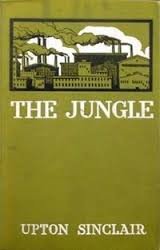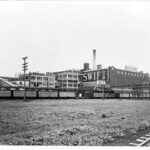
Many people believe State regulation is needed to protect us from bad business practices. I debunked this argument in How to Think About Regulation. But the belief also rests on some false history most of us learned in State schools.
Most students are taught about a famous book, The Jungle by Upton Sinclair. It supposedly shows how, once upon a time, before State regulation…
- Meat packing plants endangered Americans with poison food
- The motive was profit
But here’s what most people don’t know…
- The Jungle was a novel, not a factual report
- Most of what Sinclair wrote was pure fiction, unconnected to reality
This is your chance to learn the truth.
The Jungle was intended to dramatize working conditions, NOT food safety. In fact…
Sinclair’s fictional claims about food safety were limited to a mere 12 pages, but these pages got all the attention, leading Sinclair to later write . . .
 “I aimed at the publics’ heart, and by accident I hit it in the stomach.” [citation](Source: Gabriel Kolko, The Triumph of Conservatism: A Reinterpretation of American History, 1900-1916, Chicago: Quadrangle Books, 1967, p. 103.)[/citation]
“I aimed at the publics’ heart, and by accident I hit it in the stomach.” [citation](Source: Gabriel Kolko, The Triumph of Conservatism: A Reinterpretation of American History, 1900-1916, Chicago: Quadrangle Books, 1967, p. 103.)[/citation]
Sinclair’s novel caused a sensation. It led to Congressional investigations, even though many politicians were skeptical. For instance, here’s what President Theodore Roosevelt wrote about Sinclair in July 1906 (even though he shared Sinclair’s distrust of big business):
 “I have an utter contempt for him. He is hysterical, unbalanced, and untruthful. Three-fourths of the things he said were absolute falsehoods. For some of the remainder there was only a basis of truth.”
“I have an utter contempt for him. He is hysterical, unbalanced, and untruthful. Three-fourths of the things he said were absolute falsehoods. For some of the remainder there was only a basis of truth.”
[citation](Source: letter to William Allen White, July 31, 1906, from “The Letters of Theodore Roosevelt,” 8 vols, Cambridge: Harvard University Press, 1951-54, vol. 5, p. 340.)[/citation]
Sinclair’s fictional characters talk of workers falling into vats and being turned into “Durham’s Pure Leaf Lard,” which was then sold to the public. This was supposedly made possible by the alleged “corruption of government inspectors.” [citation](Source: The Age of the Moguls by Stewart H. Holbrook, Garden City, N.Y.: Doubleday & Company, Inc., 1953, pp. 110-111)[/citation]
Yes, you see, there were government inspectors, even back in 1905. So does it really make sense that the solution to this supposed food safety problem was . . . government inspectors?
 In fact, there were hundreds of inspectors. They came from all levels of government, federal, state, and local, and had been at work for more than a decade. As for their supposed corruption (and Sinclair’s other claims), a Congressional investigation found little evidence. Instead . . .
In fact, there were hundreds of inspectors. They came from all levels of government, federal, state, and local, and had been at work for more than a decade. As for their supposed corruption (and Sinclair’s other claims), a Congressional investigation found little evidence. Instead . . .
The 1906 report of the Department of Agriculture’s Bureau of Animal Husbandry refuted Sinclair’s worst charges point-by-point. The report labeled his claims…
- “willful and deliberate misrepresentations of fact”
- “atrocious exaggeration”
- And “not at all characteristic (of the meat packing industry)”
[citation](Source: U.S. Congress, House, Committee on Agriculture, Hearings on the So-called “Beveridge Amendment” to the Agriculture Appropriation Bill, 59th Congress, 1st Session, 1906, pp. 346-350.)[/citation]
Meanwhile, as Congress went through the time-consuming process of investigating Sinclair’s fictions, the free market was regulating the meat packing industry in its own harsh way. Meat sales plummeted.
This led the meat packing industry to lobby Congress for increased regulation!
The industry actually wanted The State to protect them from the consumer backlash by imposing regulations that would restore consumer confidence, even though new regulations were totally unneeded! The result was the passage of the Meat Inspection Act of 1906.
But this was not a triumph for the idea of State regulation. Instead, it was a victory for cronyism and corporate welfare . . .
- Taxpayers picked up the $3 million price tag for the new regulations

- Big meat packers benefited because small packers had a more difficult time complying with the new regulations
Upton Sinclair himself actually recognized this, and opposed the law! [citation](Source: Upton Sinclair, “The Condemned-Meat Industry: A Reply to Mr. J. Ogden Armour,” Everybody’s Magazine, XIV, 1906, pp. 612-613.)[/citation]
The myth of The Jungle has had a terrible impact on the American mind. It has led millions of people to believe that regulation by politicians and bureaucrats is superior to regulation by the free market forces of consumers, investors, lenders, insurance companies, and legal liability.
- If the meat packing industry wanted government regulation, then it should have paid for it, not the taxpayers
- And all packing companies should have been free to reject State regulation, especially small producers
- This would have allowed consumers to decide what they preferred, and what they were willing to pay for – meat inspected by The State, or meat regulated by the self-interest of the meat packers.
In other words…
- State regulation, using initiated force, was completely unjustified, even if Sinclair had been writing fact, instead of fiction.
- We should have relied on consumer controlled regulation instead.
We hope you decide to embrace and share the information contained in this article. You can do that right now using Facebook, Twitter, and Google+.
Please also consider subscribing to our free email newsletter using the subscription form in the right-hand column. You’ll be able to follow along as we work to share the Zero Aggression Principle with all 300 million Americans (and the rest of the world too).
Please also follow us on Facebook and Twitter. Click on the “Follow Us” buttons at the top of the page, above the banner. When you get to our Facebook page click on the “like” button and then choose “get notifications” and “add us to your interest lists.”
– End –
 Thank you to Lawrence W. Reed, President of the Foundation for Economic Education. The facts used in this essay were drawn from an article he wrote for the The Freeman: “Ideas and Consequences: Of Meat and Myth.”
Thank you to Lawrence W. Reed, President of the Foundation for Economic Education. The facts used in this essay were drawn from an article he wrote for the The Freeman: “Ideas and Consequences: Of Meat and Myth.”
His article, in turn, relied heavily on the classic book by the  historian Gabriel Kolko, The Triumph of Conservatism. Kolko may be a Marxist, but no one has done better work on the intersection of The State with American business.
historian Gabriel Kolko, The Triumph of Conservatism. Kolko may be a Marxist, but no one has done better work on the intersection of The State with American business.
 Copyright (c) 2010 by Perry Willis. Permission to distribute this blog post for educational purposes is granted, if done with attribution to the author and the Zero Aggression Project. Permission to use for commercial purposes is denied. You can find a full explanation of our copyright policy here.
Copyright (c) 2010 by Perry Willis. Permission to distribute this blog post for educational purposes is granted, if done with attribution to the author and the Zero Aggression Project. Permission to use for commercial purposes is denied. You can find a full explanation of our copyright policy here.


Reed’s history of U.S. meatpackers seeking regulation to stifle small-time competitors is reminiscent of a more recent EPA Chief who wrote the million dollar plastic liner regulation for landfills during the 1980s. This law put small time operators and municipalities without the necessary funds to convert clay-lined landfills to plastic liners out of business, creating a virtual monopoly for BFI. BFI’s appreciation was illuminated when the EPA Chief was subsequently made CEO at BFI. Meanwhile, BFI shareholders saw shares double in price and split twice. For privileged elites who can pull it off, monopoly profits always trump free market profits. The rest of us should note that monopolies do not arise naturally within a free and spontaneous exchange order, but require the cudgel of government to stifle competition. Likewise, corporations are creatures of the state.
Author
This is a very good example Bob. Thanks for sharing it. I would add that this phenomenon is also a major cause of “too big to fail.” Regulatory cronyism reduces competition and forces mergers, leading to larger and larger firms.
I would add all so-called “Free Trade” agreements to this list of regulatory overreach. None of which has turned out to be free to the American working middle-class. Again, the only winners for free trade are the big players who can afford the ante.
Author
I agree with your first statement, but only partially agree with your second. I notice that you used scare quotes around the words “Free Trade” in your fist sentence. This is appropriate. So-called “Free trade agreements” are nothing of the kind. They are managed trade designed to benefit privileged interests. So maybe we agree on this point.
But the scare quotes disappear in your third sentence. True free trade, without agreements, and without scare quotes, benefits the middle class most of all, by making products cheaper and reducing the cost of living. The lower the cost of living, the less you have to work to achieve the same lifestyle. We need to STOP focusing on our roles as employees, and focus instead on our roles as consumers. We want to be able to consume as much as we can with as little work as possible. Nothing fosters this outcome better than true free trade, including unilateral free trade, where we lower our barriers and others don’t.
Producers want us to support their protectionist trade restrictions, so they con us into thinking that our role as employees must likewise be protected. But this tricks harms us, because it restricts our more important role as consumers. We need to support free trade so we don’t have to work so hard. But these are only the practical arguments. The more important argument is this…
Trade restrictions require the initiation of force to prohibit peaceful, voluntary transactions. This is not only economic voodoo, it is also deeply immoral. It is evil. Pure evil.
Thanks for your comment.
Perry Willis
Extremely interesting article! Shared widely. 🙂
Author
Many thanks Alex!